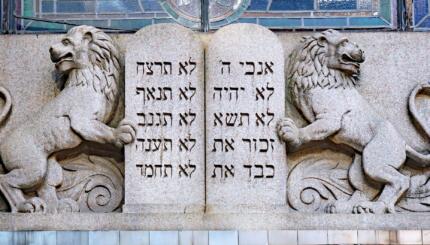There is no single Jewish conception of God. God has been described, defined, and depicted in a variety of ways in different works of Jewish literature and at different historical moments.
About God
God is beyond human comprehension, but that has not stopped Jewish thinkers from attempting to describe God. The Jewish God is referred to with many names and euphemisms, though God’s scriptural names are traditionally only pronounced during religious activities. Belief in one God is one of Judaism’s defining characteristics. Nonetheless, some parts of the seem less monotheistic than others. In addition, there are minor currents of thought within Judaism that play down the importance of belief in God.
Biblical vs. Talmudical Depictions of God
The God of the Bible has a multitude of roles and attributes that often contrast sharply with each other. In this sense, God is like a person — experiencing a range of emotions, often torn between competing allegiances and values. The God of the Bible communicates with people through prophets and is even open to critique. Of the varied biblical representations of God, the two that became particularly prominent in Jewish thought are God’s oneness and God’s role as creator of the world.
Classical rabbinic literature portrays God in a similar way. However, in rabbinic writings, God no longer communicates with people through prophecy, and God is no longer considered a direct legal authority. One of the most radical Jewish descriptions of God can be found in the heikhalot literature, an early corpus of mystical texts, which actually describes the physical dimensions of God. Though most early Jewish thinkers did not shy away from depicting God in human terms, Philo, a first-century philosopher, was an exception. He integrated Greek philosophy with Judaism and conceived of God in a more abstract way.

Help us keep Jewish knowledge accessible to millions of people around the world.
Your donation to My Jewish Learning fuels endless journeys of Jewish discovery. With your help, My Jewish Learning can continue to provide nonstop opportunities for learning, connection and growth.
God in Medieval Jewish Thought
The medieval philosophers departed from the non-systematic theology of biblical and rabbinic literature. Philosophers like Maimonides worked tirelessly to make their philosophical interests coincide with the truths of the Bible. They wrote proofs for the existence of God and struggled with passages in the Torah that seem to compromise God’s unity. The medieval mystics–or kabbalists–also developed systematic theologies. They posited that God in Himself–known as the Ein Sof, or Infinite–cannot be discussed or described. However, God is revealed in the 10 sefirot, divine attributes or powers, and this manifest form of God is intelligible to humankind.
Modern Jewish Views of God
Secularization and the values of the modern world have created challenges for traditional conceptions of the Jewish God. Jewish thinkers adjusted to the rationalistic universalism of early modern philosophy by focusing on the ethical implications of Judaism’s belief in one God. Later, existentialists like Martin Buber focused on the experiential relationship between humans and God. Mordecai Kaplan and Richard Rubenstein took the challenges of scientific naturalism and the Holocaust so seriously that they rejected the traditional Jewish God. Finally, feminism raised serious questions about the problems of a male God.



